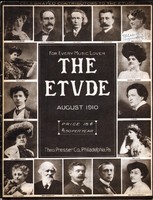BY SIDNEY SILBER.
How many pianoforte students and players really hear themselves as others do? Perhaps, just as few as see themselves as others do. My experiences with students of varied temperaments, coupled with my own, have led me to the conviction that but a small percentage of serious and talented students ever fully realize the requirements of their texts. Modern musical orthography has developed to such a high degree of perfection (and complexity, likewise), to represent the composer's intentions, that it seems an amusing paradox that most students fail to grasp the spirit of music "because the notes are in the way." It often seems to me that it were far better to simplify our present orthography by eliminating everything but the time, tonality signatures and tonal values. For is not this painfully exact playing "measure for measure" the cause of the "comedy of errors," resulting in a performance not "as you like it?"
Now, granting that the really musical student divines intuitively the composer's wishes—his spirit— is it a necessary conclusion that he will impress his listeners in like manner? Experience does not bear this out. When I imitate the playing of my own pupils, they sometimes stand aghast to think that they should have communicated diametrically opposite impressions from those intended. The case is quite analogous to spoken language. How often do we produce wrong impressions, not in keeping with our intentions, at any rate, by the improper use of words or inflection?
It is the duty of the aspiring pianoforte student, first to divine the composer's feelings and emotions as best he can, then present them in a manner that his listeners will be likewise impressed. To do this, he must listen to his playing very carefully. His attitudes, his gestures are also sometimes to blame for improper communication of ideas. Subjectivity in musical interpretation is certainly a fine quality to possess; but, by far, more valuable is a harmonious development of the subjective and objective faculties. An artist is one who makes others feel music as he does—herein lies a valuable lesson, worthy of the emulation of all serious students.



